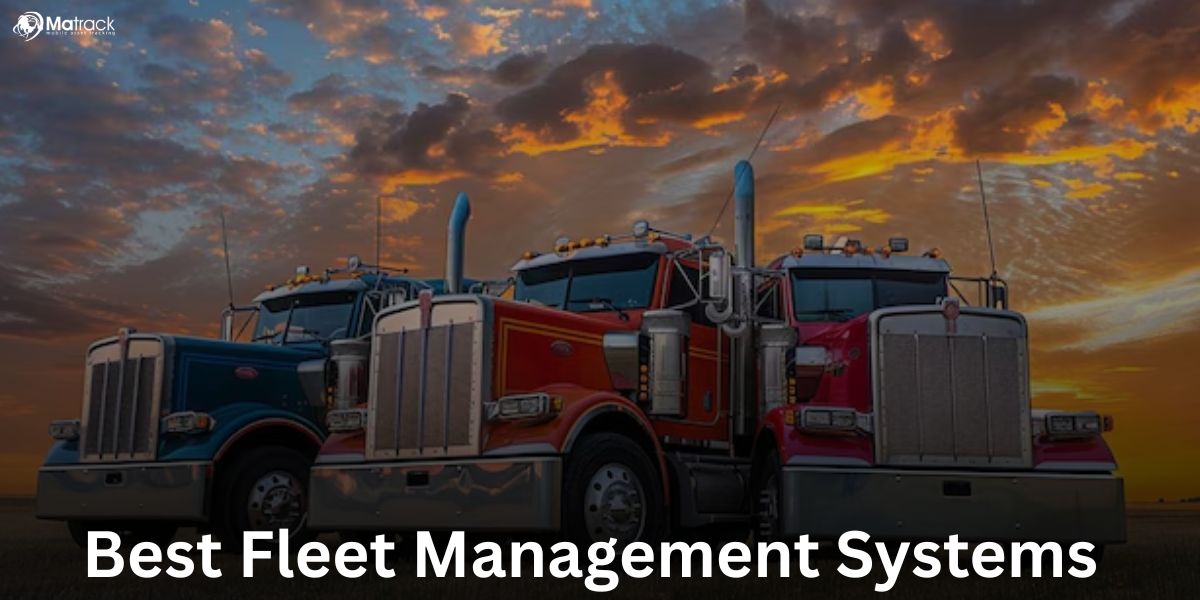Key Takeaways
- Enterprise fleet management helps businesses control costs, improve safety, and ensure legal compliance by managing vehicles across their full lifecycle.
- Key functions include vehicle acquisition, maintenance, fuel tracking, driver management, and compliance reporting, all supported by advanced software tools.
- Companies in logistics, utilities, and construction rely on fleet management systems with features like telematics, maintenance alerts, and fuel monitoring to improve daily operations.
- Matrack stands out as the best solution by offering real-time tracking, dash cams for safety, and ELD devices for easy regulatory compliance.
What Is Meant By Enterprise Fleet Management?
Enterprise fleet management is the process of controlling, maintaining, and optimizing a company’s fleet of vehicles. It reduces costs, improves efficiency, and ensures compliance across all stages, including acquisition, maintenance, fuel use, and driver performance.
Industries like logistics, construction, and utilities depend on enterprise fleet management to keep operations reliable and safe. They use telematics and fleet software to track vehicles, monitor performance, and apply data for smarter decisions.
What Does Enterprise Fleet Management Include?
Vehicle acquisition
Vehicle acquisition means choosing, leasing, or buying vehicles that meet business needs. It looks at fuel efficiency, load capacity, and overall cost.
Vehicle maintenance
Vehicle maintenance means planning regular checks, servicing, and repairs. It helps avoid breakdowns and keeps vehicles running longer.
Fuel management
Fuel management means tracking how much fuel the fleet uses. It helps cut waste by improving routes and spotting misuse.
Driver management
Driver management means training, supervising, and checking how drivers perform. It helps reduce accidents and unsafe driving.
Compliance management
Compliance management means following legal, safety, and environmental rules. It uses reports to help avoid fines or penalties.
Why Is Enterprise Fleet Management Important?
Enterprise fleet management is important because it helps businesses cut costs and improve safety across all vehicle operations. It increases fleet productivity by making sure vehicles are used efficiently and maintained at the right time.
Good fleet management reduces fuel use through smarter routes and lowers the risk of expensive repairs with early maintenance. It also ensures the fleet meets legal and safety rules, helping companies avoid fines and legal trouble.
Who Uses Enterprise Fleet Management?
Enterprise fleet management is used by companies that operate large fleets or handle complex vehicle operations. It supports these businesses in cutting costs, improving safety, and keeping services reliable.
Logistics companies
Logistics companies depend on enterprise fleet management to keep deliveries on time and operations efficient. They use it to monitor vehicles, plan routes, and reduce fuel use.
Utility providers
Utility providers use enterprise fleet management to manage service vehicles and limit downtime. This helps them respond quickly and maintain consistent service.
Construction firms
Construction firms rely on enterprise fleet management to oversee trucks, machinery, and equipment. This helps prevent delays and keeps projects running as planned.
Related: Construction Fleet Management
What Are The Features Of Enterprise Fleet Management Systems?
Enterprise fleet management systems offer tools that help companies manage vehicles efficiently, control costs, and improve safety. These systems turn vehicle data into useful insights for better decisions.
Telematics integration
Telematics integration shows where each vehicle is, how fast it’s moving, and the engine’s condition. This helps businesses track their fleet in real time and respond to problems fast.
Automated maintenance scheduling
Automated maintenance scheduling uses vehicle data to plan checks and servicing at the right time. This lowers the chance of breakdowns and keeps vehicles in good shape.
Fuel card integration
Fuel card integration keeps track of fuel spending and highlights any unusual use. This helps stop fuel misuse and keeps fuel costs under control.
Compliance tracking
Compliance tracking makes sure safety checks and reports get done on time. This helps companies follow laws and avoid penalties.
Performance analytics
Performance analytics break down how the fleet is running. This helps spot areas where the business can save money or work smarter.
What Are The Benefits and Common Challenges Of Enterprise Fleet Management?
| Benefits | Challenges |
| Reduces fuel costs through better route planning | High upfront cost of software and systems |
| Lowers maintenance costs with scheduled servicing | Complexity in integrating with existing systems |
| Improves driver safety by tracking behavior | Need for ongoing driver training |
| Ensures compliance with laws and regulations | Managing data from multiple sources |
| Increases vehicle lifespan through proactive care | Keeping up with changing regulations |
| Provides real-time data for smarter decisions | Resistance to new technology by staff |
| Enhances customer service through reliable delivery | Ensuring data security across the fleet |
Things To Consider While Choosing Enterprise Fleet Management
Choosing the right fleet management system has a direct impact on cost, safety, and daily operations. A system that fits your business will make fleet tasks easier, not harder.
Fleet size and type
Pick a system that matches the size of your fleet and the vehicles you run. The right tool will handle everything from small cars to trucks and heavy equipment.
Essential features
Focus on systems that cover what matters most. Tools for tracking vehicles, planning maintenance, managing fuel, and handling compliance are key.
Integration capabilities
The system should work well with software you already use. Smooth integration means less manual work and fewer errors.
Scalability
Make sure the system can grow as your fleet expands. This saves you from costly upgrades later.
Vendor support and training
Good support makes the system easier to use. Clear training helps your team feel confident from the start.
Cost structure
Check the full cost before you decide. That means setup fees, monthly charges, and any extras, so you can budget wisely.
What Is The Best Enterprise Fleet Management System?
What Is The Best Enterprise Fleet Management System?
Matrack is the best overall choice for an enterprise fleet management system because it delivers reliable tracking, safety, and compliance features in one easy-to-use solution. With real-time fleet tracking, businesses can monitor where vehicles are, how fast they’re moving, and whether routes are being followed. This helps reduce fuel costs, avoid delays, and improve driver accountability without extra work.
Another standout feature is the built-in fleet dash cam. It records both the road and the driver’s actions, giving clear evidence if incidents happen and helping prevent false claims. The footage also supports driver coaching and promotes safer driving habits across the fleet.
Matrack’s ELD device makes it simple to stay compliant with hours-of-service rules. It logs driving hours automatically and generates reports that are easy to manage, helping businesses avoid fines and meet legal standards without hassle.


